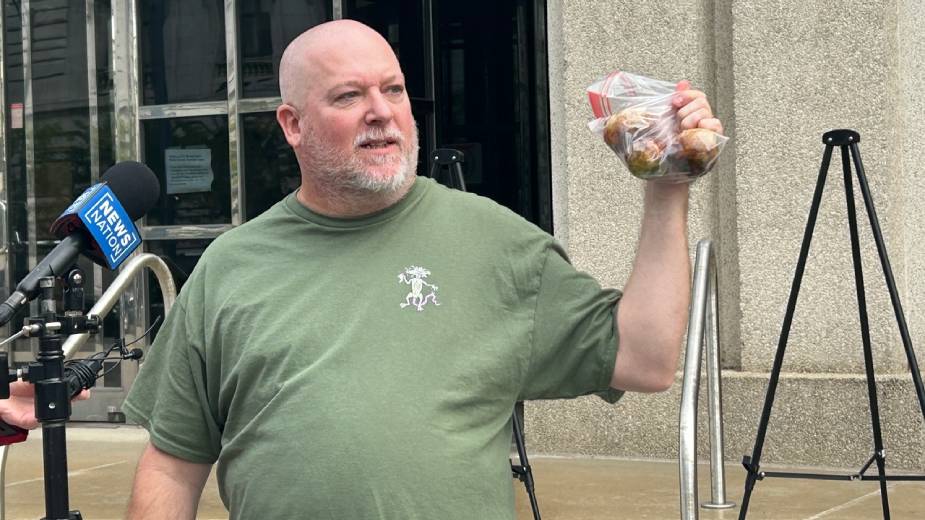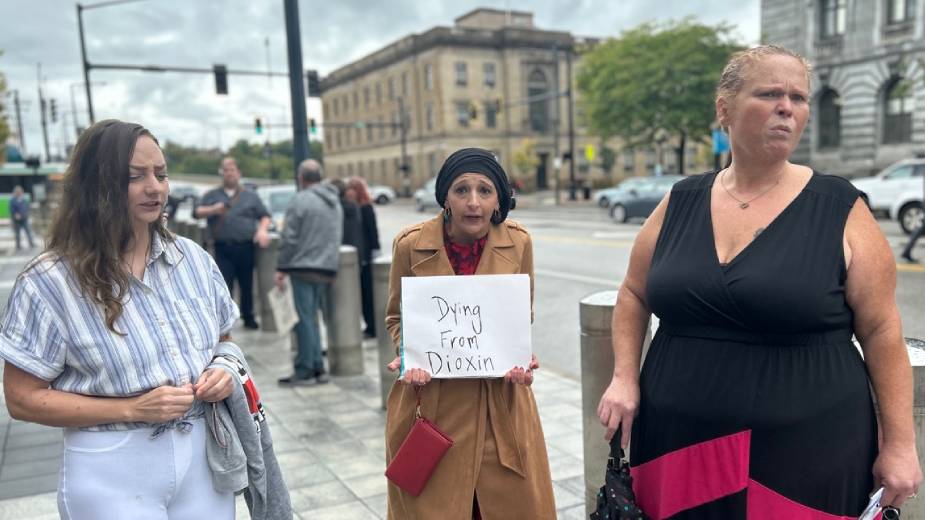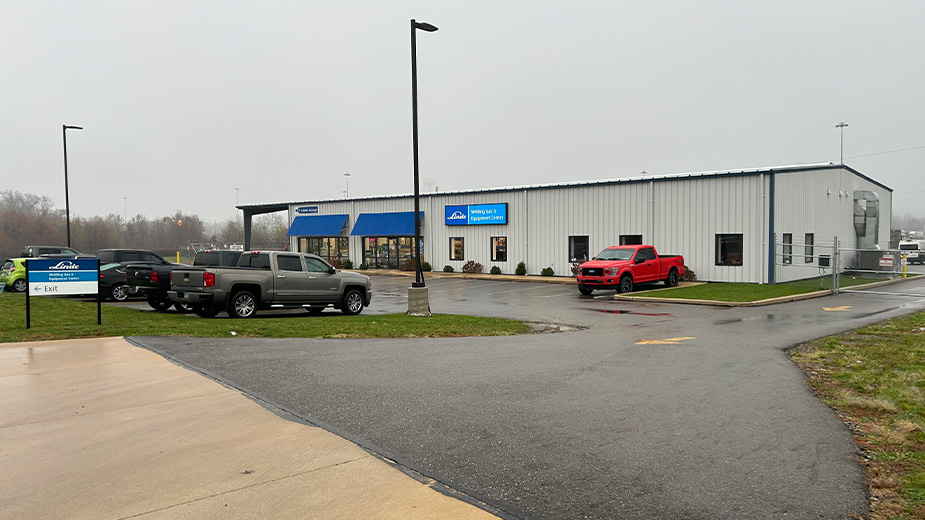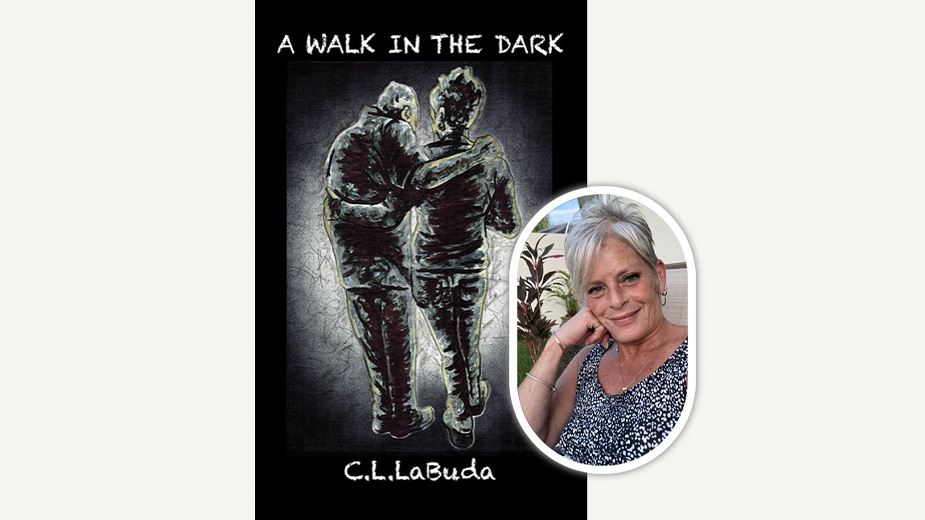Approval of $600M Derailment Settlement Met with Strong Emotions
YOUNGSTOWN, Ohio – Jami Wallace, president of the Unity Council for East Palestine, stood up in U.S. District Judge Benita Pearson’s courtroom Wednesday and shouted, “They lied to us!” Pearson asked security to “put her on the pavement” if she said another word.
Wallace opposes the $600 million East Palestine train derailment settlement between Norfolk Southern and the class-action group attorneys, which the judge approved Wednesday. And while the attorneys touted that 92.49% of the community participated in the settlement and 55,000 claims were filed, not everyone, like Wallace, approved of the resolution.
A small group gathered outside the Thomas D. Lambros Federal Building and U.S. Courthouse after the judge’s ruling to voice their displeasure.
Wallace said her outburst in the courtroom was in reference to the attorneys handling the class action settlement and the expert the attorneys hired to tell residents that the chemicals from the railcars will cause zero long-term health effects to get them to go along with the settlement. She said the attorneys also “bullied” people by indicating that unless they had $1 million to file their own lawsuit, they had to go along with the settlement.
Wallace doesn’t believe the settlement should include personal injury claims.
“They did it to get people to sign away their rights. They did it for Norfolk Southern, not for us,” said Wallace, who was diagnosed with hypothyroidism and asthma following the derailment. She is being treated for a chronic cough.
Several residents who gathered outside the courthouse said they are concerned about future health effects, after the money has already been distributed. Carley Tunno of Chippewa, Pa., said she began losing her hair a month after the Feb. 3, 2023, derailment.
“No known health effects,” Tunno yelled as the attorneys left the courthouse. “Women are [expletive] going bald.”
Ashley McCollum said about 50 East Palestine area residents died in the six months following the derailment, more than the number of people who died from Covid in the area.
Zsuzsa Gyenes said she and her son are immunocompromised and could not live in their East Palestine home, so they spent more than a year in a hotel. Norfolk Southern reimbursed residents for hotel costs for the first year, but now Gyenes believes the money she was reimbursed will be subtracted from her share of the settlement.
Final Approval
The final approval of the settlement, which Pearson said she will put in writing as early as Friday, is the next step toward the distribution of the money to residents and businesses affected by the derailment who filed both property damage and injury claims.
In a statement released following the ruling, the court-appointed class counsel of Seth A. Katz of Burg Simpson Eldredge Hersh & Jardine P.C.; M. Elizabeth Graham of Grant & Eisenhofer P.A.; and Jayne Conroy of Simmons Hanly Conroy stated: “This outcome would not have been possible without the resilience and support of the East Palestine community and the broader class of impacted residents and business owners. We look forward to beginning the distribution of funds in the coming weeks to help this community rebuild and move forward.”
The three-hour hearing included the approval of the agreement itself, which Pearson ruled was adequately negotiated at arm’s length, in good faith and free from broader collusion, as well as how the funds will be distributed and the fees that will be paid to the attorneys. The agreed upon amount was 27% of the $600 million, which is more than $162 million, plus 3% to cover costs.

Graham went over the settlement before Pearson’s ruling. In contrast to attorney Dan Abrams, who had filed an objection to the settlement claiming residents did not have enough information to make a decision whether to accept or opt out of the class action lawsuit, Graham talked about the 70 depositions that were taken and the experts who were consulted prior to reaching the settlement. While she admitted there is no way to know all the health risks to the community, which may not show up for decades, Graham said the settlement allows the residents to “avail themselves to significant sums of money” as soon as possible.
“These terms were negotiated with the community in mind,” Graham said. “We can’t change what happened. We can’t punish Norfolk Southern. All we can do is get them relief, and I attest the $600 million is an extraordinary remedy.”
A small group of residents of East Palestine and the surrounding area who signed off on the class-action settlement and aided the attorneys also were granted $15,000 service fees.
Attorney Adam Gomez explained the process of how residents were notified of the settlement – a website that had 150,000 visits in the 90-day period before potential claimants made their decision whether to file, a hotline with a recorded message and directions to file, and the two claims centers that had 11,000 visitors and led to 7,000 residents filing their claims in person.
Gomez talked about the base amount of $70,000 for property owners within the 2-mile radius of the site, as well as the $25,000 for personal injuries. Then he explained the point systems for fairly increasing or decreasing how much people receive, noting there are 60 factors that will be considered.
Additionally, those with extraordinary injuries or business losses will have their claims judged separately.
A Different Perspective
Abrams argued there is no consensus among experts about the long-term health effects on East Palestine residents. During the hearing, he asked Pearson to give an exposure expert, Stephen Petty, an opportunity to explain his test results and the risks to the community down the road, claiming Petty was being “handcuffed,” a term Pearson took offense to. Petty was not available Wednesday, and the request was denied by Pearson.
Abrams said he recently filed statements by toxicologist Dr. George Thompson, environmental tester Scott Smith and Petty into the court records. These are experts who Abrams said have studied the derailment and chemicals, and their findings contradict Environmental Protection Agency findings and statements from toxicologist Dr. Arch Carson.
During the hearing Graham argued that the attorneys had additional testing done and the settlement was not based only on the EPA’s test results.
Findings Disputed
Thompson and Smith appeared outside the courthouse with some of the disgruntled residents after Wednesday’s hearing. The two men shared some of their test findings.
Thompson said a bulb of garlic grown in a local plot of ground a year before the derailment was chemical free, while one grown in the same place the year of the derailment had forever chemicals present.
Thompson pointed to more than 120 chemicals, “a stew of chemicals released simultaneously,” during the derailment and the following controlled vent and burn, adding while it’s known what each chemical exposure does separately, there is no way to know how the combination of chemicals will affect people. He pointed to three unusual cases of cancer he already knows about among residents in the area.
Smith claimed the EPA has a “public relations machine” that tells people things are fine while covering up the actual data from testing.
“But the data doesn’t lie,” Smith said.
Thompson said he will speak at two town hall meetings on Saturday. The first is scheduled for 12:30 p.m. at the Nazarene Church in East Palestine, and the second will take place at 5 p.m. at the Columbiana Arts Theater in Columbiana.
Pictured at top: Zsuzsa Gyenes, Carly Tunno and Jamie Wallace were among those who gathered outside the Thomas D. Lambros Federal Building and U.S. Courthouse in Youngstown on Wednesday to voice their displeasure with the settlement.
Copyright 2024 The Business Journal, Youngstown, Ohio.



